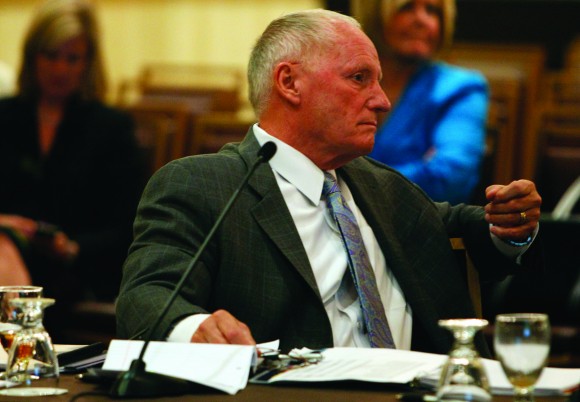The top official of Florida’s state-backed property insurer stepped forward yesterday to defend his organization’s international travel, arguing it was necessary to conclude a $3.1 billion risk transfer plan.
Citizens Property Insurance Corp. President Barry Gilway has found himself under fire in recent weeks by Gov. Rick Scott over press reports that detailed the insurer’s overseas travel.
Specifically, Scott questioned the role of Citizens Chair Chris Gardner, who on a trip to Bermuda was reimbursed for a two-night hotel stay at $104 above Citizens overseas travel guidelines. Gardner reimbursed Citizens for the overage, which was caught by the insurer in an internal review.
Gilway defended the oversees travel based on the circumstances behind its $3.1 billion risk transfer plan, which included a $1.5 billion catastrophic bond deal that was facilitated through the Bermuda-based Everglades Re. Ltd, which was created specifically to issue the bonds.
Gilway cited the business needs and economic gains that came from trips to Bermuda and Zurich. For instance, he said, due to Internal Revenue Rules, many meetings with offshore investors have to be conducted overseas.
According to Citizens, 57.2 percent of its investors are offshore including 32.6 percent that are from Western Europe, 23.1 percent from Bermuda and 1.5 percent from Asia.
Gilway said when Citizens is asking those investors to place their trust in it at the substantial amounts they are, it is imperative that the insurer and investors have a professional relationship.
All told, Citizens paid out $48,000 for oversees travel, including $6,500 for Chairman Chris Gardner to make three trips including the trip in question to Bermuda.
“I’ve been in the business for 44 years and in 35 of those years I’ve had to travel to Bermuda,” said Gilway. “I know that face-to-face discussions with the individuals who are making the decisions is absolutely necessary.”
The results of those meetings and the subsequent financial commitments, Gilway said, have greatly benefited Floridians by lowering the potential assessment burden from 11.6 percent to 2.3 percent. Additionally, next year up to 70 percent of Citizens policyholders may see a rate decrease for the first time in five years.
Gardner has 20 years of experience in commercial property and casualty insurance brokerage. He is a managing shareholder of Kuykendall Gardner. Neither Gardner nor his insurance firm has any current business before Citizens, according to officials.
Citizens is still under a cloud over exorbitant travel expenses and employee misconduct that occurred under Gilway’s predecessor.
While Scott praised Gilway on one hand, he also pointed out that the insurer has to be sensitive to public perception.
“You’ve done a great job, the risk of Citizens is down, the size of Citizens is down and the cost of travel is down,” said Scott. “But everybody, they’re going to watch and when everybody is still concerned about property insurance an example like this makes it look like you’re not watching expenses.”
Chief Financial Officer Jeff Atwater echoed Scott’s comments in that while overseas travel might be necessary; Citizens still must deal with its legacy of past troubles with employee misconduct and travel costs.
Atwater said those past stories created public skepticism about whether Citizens has really changed its corporate climate.
“Are we past this, I believe we have, but I don’t want there to be any question in anybody’s mind,” said Atwater.
Q&A with Florida’s Citizens CEO Gilway: Leading in the Public Sector
Gilway said that the insurer has followed the recommendations of the Chief Inspector General and required individuals traveling in-state and interstate to follow state of Florida guidelines. For overseas travel, Citizens adheres to the guidelines set out by the U.S. Department of State.
Gilway, however, said Scott and Atwater’s concerns are not taken lightly.
“The challenge we have is this: we have to be incredibly aware of expenses and look for every dime we can save,” said Gilway. “At the same time, we have to recognize that to get the advantages we gained as a result of this risk transfer placement, we need a professional team to present to reinsurers and investors.”
Gilway was not alone when it came to defending the need of Citizens officials to travel oversees to secure its risk transfer program.
Association of Bermuda Insurers and Reinsurers President Bradley Kading, in a letter presented to the Cabinet, reiterated the need of Citizens to travel overseas to conduct business with some entities.
He said that the face-to-face meetings among insurers, investors and Citizens officials were critical in helping the insurer achieve its risk-transfer program at far more favorable terms than in previous years.
“Based on my discussions with my members, it is clear that the travel of Citizens senior management to Bermuda was not only consistent with industry practices, it was essential to building an appropriate-sized and efficiently-priced reinsurance program,” wrote Kading.
Related Articles:
Florida Frets That With Proposed Rate Cut, Citizens Could Be Too Competitive
Florida 1.3% Hurricane Tax to End in January
Florida’s Citizens Votes to Lower Rates Next Year
Florida Audit Says Citizens’ Travel Expenses Excessive; Governor Orders Reform
Was this article valuable?
Here are more articles you may enjoy.



 Florida Engineers: Winds Under 110 mph Simply Do Not Damage Concrete Tiles
Florida Engineers: Winds Under 110 mph Simply Do Not Damage Concrete Tiles  Zurich Insurance Profit Beats Estimates as CEO Eyes Beazley
Zurich Insurance Profit Beats Estimates as CEO Eyes Beazley  Insurance Broker Stocks Sink as AI App Sparks Disruption Fears
Insurance Broker Stocks Sink as AI App Sparks Disruption Fears  World’s Growing Civil Unrest Has an Insurance Sting
World’s Growing Civil Unrest Has an Insurance Sting 

